
Newfoundland
| Full Name | 58 Dominion of Newfoundland | |
| Alliance | Allies - Minor Member Nation or Possession | |
| Possessing Power | United Kingdom | |
| Population in 1939 | 300,000 | |
| Military Deaths in WW2 | 1,000 |
Contributor: C. Peter Chen
ww2dbaseAlthough the British colony of Newfoundland had been self-governing since 1855, the official name Dominion of Newfoundland was not established until 1907. During WW1, the 1st Newfoundland Regiment served in France, participating in, among others, the Battle of the Somme; the unit would earn the "Royal" prefix for its gallantry during WW1. Newfoundland suffered considerably during the Great Depression, leading to serious stability issues with the government; as the result, in 1934, the parliament of Newfoundland relinquished self-government, giving power back to Britain.
ww2dbaseNewfoundland's strategic location in the Battle of the Atlantic drew the attention of the British, the Canadians, and the Americans. The defense of Newfoundland largely fell on the shoulders of Canada and the United States. The Canadian contribution to the Newfoundland defense between 1940 and 1945 amounted to approximately C$65,000,000, expanding airfields, naval repair facilities, and coastal batteries. During the war, the Royal Canadian Air Force stationed aircraft and personnel at Gander and Botwood while the Canadian Army and the Royal Canadian Navy operated out of St. John's; about 16,000 Canadian military personnel were in Newfoundland at any given time. The Americans, who first arrived in Jan 1941 prior to the country's actual entry in the war, invested about US$100,000,000 in Newfoundland, building military structures, building hospitals, rebuilding the Holyrood-Argentia highway, etc.; at the end of the war, about 100,000 Americans were based in Newfoundland, generally at St. John's, Argentia, and Stephenville.
ww2dbaseThe need for labor at these bases meant Newfoundland's economic situation would begin to improve. Once on the verge of default in the 1930s, the 1940s Newfoundland prospered, so much so that it was loaning money to the United Kingdom to help fund war efforts.
ww2dbaseNewfoundland formed a small militia force shortly after the start of the European War. This unit would become the Newfoundland Regiment in 1943, 1,668-strong by the war's end. Although the regiment's name invoked memories of the 1st Newfoundland Regiment of the WW1-era, Newfoundland refused to raise the large sums of money required for an expeditionary force. Many of those who wished to fight, much like their American counterparts prior to US' entry into war, enlisted in the forces of Britain and Canada. 2,889 Newfoundland men enlisted in the British Royal Navy, 2,343 men in the British Royal Artillery (all of whom were assigned to either the 166th (Newfoundland) Field Regiment or the 59th (Newfoundland) Heavy Regiment), 712 men in the British Royal Air Force (some of whom served as nightfighter pilots in the No. 125 (Newfoundland) Squadron), 1,160 men in Canadian forces, and more than 500 women in the female branches of the Canadian military. About 1,000 military personnel from Newfoundland were killed during the war.
ww2dbaseAs the war moved toward its conclusion and Newfoundland out of economic difficulties, the dominion engaged in a new round of discussion in regards to its political future. While the bulk of the population swayed between re-acquiring independence and a union with Canada, a growing movement looked to joining the United States. Canada viewed this sentiment with alarm, as it feared that United States might have long term interests in Newfoundland, which conflicted with Canadian designs. The movement for a union with the United States was suppressed by Britain, and in the interest of Allied cooperation the United States ignored this movement.
ww2dbaseAfter the war, in 1946, the Newfoundland National Convention chose to hold an election to determine the dominion's future. The first referendum, which took place in Jun 1948, was inconclusive. The second, which took place a month later, showed that 52% of the population was in favor of a union with Canada. On 31 Mar 1949, Newfoundland officially became a Canadian province.
ww2dbaseThe United States Air Force retained Stephenville and the United States Navy retained Argentia as miltiary bases until 1966 and until 1994, respectively. In 1946, the USAF established the Pepperrell Air Force Base in St. John's, operating it until 1961.
ww2dbaseSources:
Newfoundland and Labrador Heritage
Wikipedia
Last Major Update: Jun 2012
| Events Taken Place in Newfoundland | ||
| Atlantic Charter Conference | 9 Aug 1941 - 12 Aug 1941 | |
| Weather Station Kurt | 22 Oct 1943 - 23 Oct 1943 | |
Photographs
 |  |  |  |
Newfoundland in World War II Interactive Map
Please consider supporting us on Patreon. Even $1 per month will go a long way! Thank you. Please help us spread the word: Stay updated with WW2DB: |
Visitor Submitted Comments
17 Dec 2020 03:21:58 PM
looking for more information about Clarence Arthur Evans from Hants Harbour, died 13 November 1941, while in Royal Navy
11 Apr 2022 01:30:59 PM
I have over 20 photos of life on the base in wwii at St John’s. My uncle took them, but prior to his marriage to my oldest aunt. He is not in any of them because he took the pictures. I’d be happy to send them to someone!
All visitor submitted comments are opinions of those making the submissions and do not reflect views of WW2DB.
- » US Women's Army Corps "Six Triple Eight" Awarded with Congressional Gold Medal (30 Apr 2025)
- » Wreck of Soviet Submarine M-49 Found (10 Apr 2025)
- » Japanese Emperor Visited Iwoto (Iwo Jima) (8 Apr 2025)
- » Race, Holocaust, and African-American WW2 Histories Removed from the US Naval Academy Library (7 Apr 2025)
- » US Government Plans to Purge WW2 Information (17 Mar 2025)
- » See all news
- » 1,167 biographies
- » 337 events
- » 44,612 timeline entries
- » 1,244 ships
- » 350 aircraft models
- » 207 vehicle models
- » 376 weapon models
- » 123 historical documents
- » 261 facilities
- » 470 book reviews
- » 28,514 photos
- » 365 maps
Chiang Kaishek, 31 Jul 1937
Please consider supporting us on Patreon. Even $1 a month will go a long way. Thank you!
Or, please support us by purchasing some WW2DB merchandise at TeeSpring, Thank you!
6 Dec 2020 08:22:38 AM
Looking for3 Missing ages and 1 missing Ser.#
Name Age Ser. # Regiment Rank Death Date
Hart, Donald Edgar ?? 889 Royal Newfoundland Regiment - Newfoundlander- Private December 12, 1942
Jestigan, John ?? ???? Royal Newfoundland Regiment - Newfoundlander- Private December 12, 1942
Lilly, John ?? 815 Royal Newfoundland Regiment - Newfoundlander- Private December 12, 1942